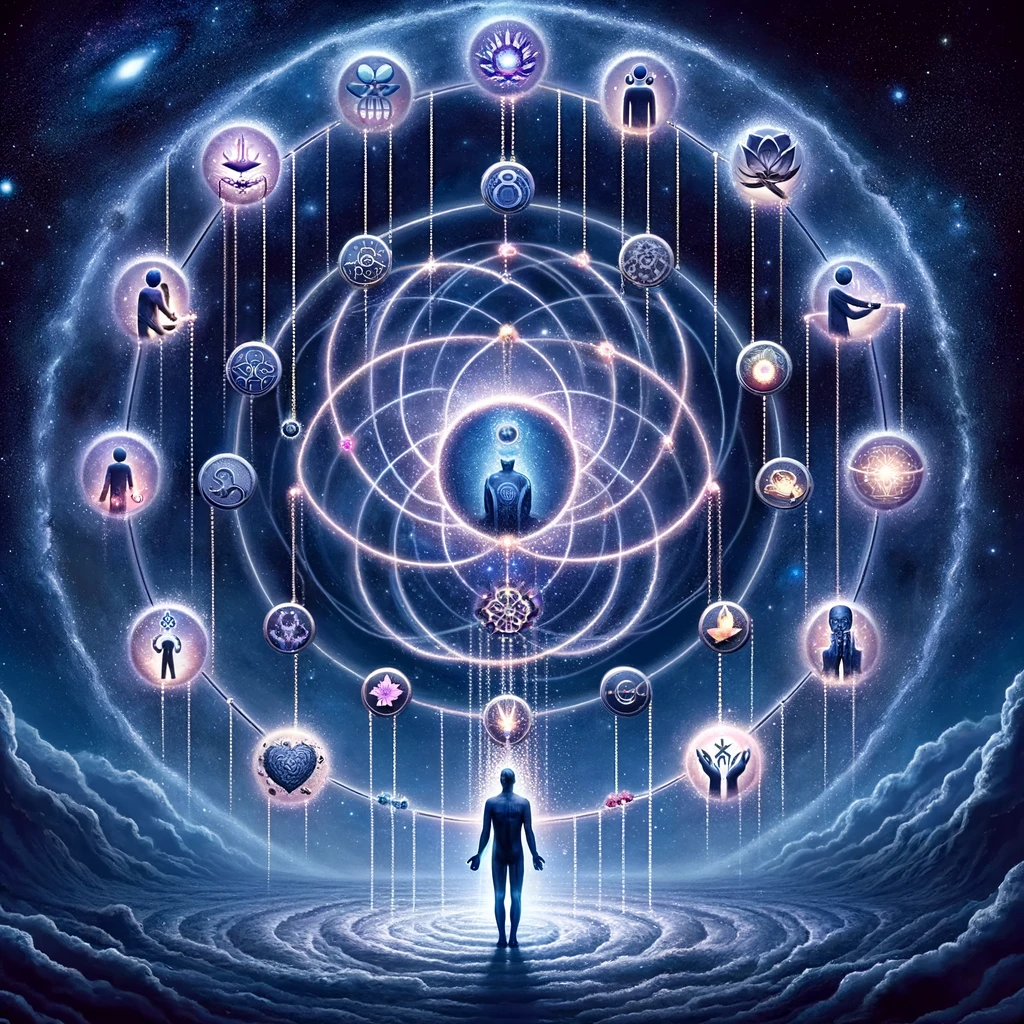Understanding Karma, morality, and personal responsibility

For every action a person takes, there is an inevitable response, a consequence that will follow, connecting the action back to the source.
Just as a spider’s web provides support while also ensnaring the spider, individuals reap the rewards of their wise choices and endure the consequences of their unwise decisions.
Despite some people’s hope of evading repercussions for their actions, eventually, possibly even across multiple lifetimes, they will experience the suffering brought about by their poor choices.
The yoke of Personal Responsibility
Individuals harm others out of personal self-interest, believing they can escape accountability for their actions.
If people’s actions carried no repercussions, they would likely act on their worst desires and impulses.
Many religions and cultures create the idea of Hell as a universal deterrent against escaping consequences in one’s lifetime, in the hope that some may choose to behave morally to avoid eternal punishment.
Over time, this concept has become weighed down by legalistic interpretations, fruitless debates over doctrine, and intellectual analysis that it lacks the emotional impact to effectively deter people, assuming it ever did.
Karma is the burdensome yoke of personal responsibility every ego wants to avoid.
Yet, it must be chosen.

People have been imposing their Gods on each other since antiquity, forcing them to see the Light by using Dark, usually extinguishing the flames of heathens and heretics if they refused to accept someone else’s Salvation.
It was never about them, the people supposedly being Saved.
Moral Compass
Buddhism is different: It’s a path of choice.
Everyone has the option to embrace or reject the influence of Karma, which serves as a guiding force.
If they reject Karma, that doesn’t negate the law of cause and effect. It merely means the individual foolishly ignores the potential (inevitable) consequences and hopes for the best.
If a person genuinely believes that their actions will inevitably return to them in some manner, with no possibility of evading accountability, they feel compelled to consider the consequences deeply.
This realization, when it deeply resonates within their being, dissuades them from imposing their self-centered desires upon others. They no longer feel like they can act with impunity.
The potency of Karma lies in its capacity to dissuade individuals from causing harm to others, and it bolsters their commitment to virtuous behavior.
When people learn to navigate their lives guided by Karma, it becomes an invaluable moral compass, akin to a needle that steadfastly directs their heart toward True North, guiding them along the Proper Path.

Below is a summary of Lamrim’s teachings as influenced by Geshe Kelsang Gyatso:
- Law of Karma: Central to Lamrim’s teachings is the concept of karma, the law of cause and effect. Our actions have consequences, both in this life and in future lives. Positive actions lead to positive results, while negative actions lead to negative results.
- Understanding Karma: Actions are not isolated events but are connected to intentions, motivations, and their effects. Karma operates on the principle of ethical causality.
- Ethical Conduct: Practitioners are encouraged to refrain from harmful actions, such as killing, stealing, lying, and engaging in unwholesome behavior, and instead cultivate virtuous actions based on compassion and wisdom.
- Understanding Rebirth: Lamrim’s teachings connect actions and their effects to the cycle of rebirth. Positive karma can lead to a fortunate rebirth, while negative karma can result in an unfortunate one, which motivates practitioners to engage in virtuous actions.
- Four Powers of Purification: Geshe Kelsang Gyatso elaborates on the Four Powers of Purification, which are fundamental in Lamrim practice:
- The Power of Regret: Acknowledging and feeling remorse for negative actions.
- The Power of Reliance: Taking refuge in the Three Jewels (Buddha, Dharma, Sangha) and seeking their guidance and support.
- The Power of the Opposite Force: Engaging in virtuous actions and cultivating positive qualities to counterbalance negative karma.
- The Power of Resolution: Making a sincere commitment not to repeat negative actions.
The Power of Regret
The motto “Live with no regrets” embodies the essence of Desire, but it’s poor spiritual guidance.
Living a life devoid of regrets signifies a failure to derive wisdom from one’s mistakes.
Selfish people go through life obtaining whatever they want without regard to how their actions impact others.
Even if they were aware of the pain they inflicted, they wouldn’t feel remorse or regret about what they did.
Selfish individuals recoil when confronted with the uncomfortable emotions associated with remorse assuming they feel it at all.
Moral people, upon honest reflection on their behavior, have an unpleasant sensation of disgust emerge. The more they delve into this introspection, the more intense this inner turmoil becomes.
That unpleasant feeling is a virtue—the power of regret.
It’s a feeling to be cultivated and remembered because it will arise when it’s needed.

Anticipatory Regret
Whenever moral people consider actions, they consider how their behaviors will impact others.
If they foresee that their actions may harm others, remorseful feelings from past failings will arise.
Anticipatory regret serves as a warning that continuing down this path would likely result in hurting other people and feeling deep regret over that action.
Anticipatory regret is what moral people want.
The message from feeling anticipatory regret is clear: don’t do it because the likelihood of feeling regret later is high.
Personal Responsibility
Embracing the principles of Karma, people choose to shoulder complete responsibility for every event in life.
This decision stems from a profound understanding that unwise actions, causing harm to others, or engaging in wrongdoing, would inevitably rebound upon them.
Wise and moral people seek to avoid such negative repercussions altogether.
With personal responsibility, there is no room for appeals for clemency, transferring consequences to someone else, or presenting justifications in the hope of a favorable judgment.
The potential outcomes that await those who venture down a morally questionable path are both unpredictable and undesirable.
People endure retaliation from rivals, the revelation of long-buried past transgressions, and the tormenting presence of concealed secrets that disrupt their peace of mind.
Emotionally, this approach leaves a person in a perpetual state of anxiety, always dreading the unknown negative consequences of their previous actions.
This is a situation that wise people avoid at all costs.
Meditation on Actions and Their Effects
The purpose of this post and this meditation is to motivate you to live a virtuous life.
If you consider Karma carefully and observe how it works, you should be encouraged to purify non-virtue and practice virtue to ensure a human rebirth and progress on the path to enlightenment in this life.
Contemplation
Consider what you read in this post and focus on the following first-person narrative:
If I purify all my non-virtues, then there will be no risk of lower rebirth.
If I take advantage of my precious human life, and accumulate merit through virtuous behavior helping others, then I will take a human rebirth, and I will progress toward enlightenment in this life and in future lives.
As a bonus, I will enjoy peace of mind and happiness for the remainder of this life, for however long that is.
Object of Mediation
After repeatedly contemplating these points, you should form a strong determination to purify non-virtue and put great effort into accumulating merit through virtuous behavior.
You should hold that determination in your mind without distraction for as long as possible. If you lose the feeling of determination, you should remember the contemplation and repeat it until the determination returns.

~~wink~~
Anatta
